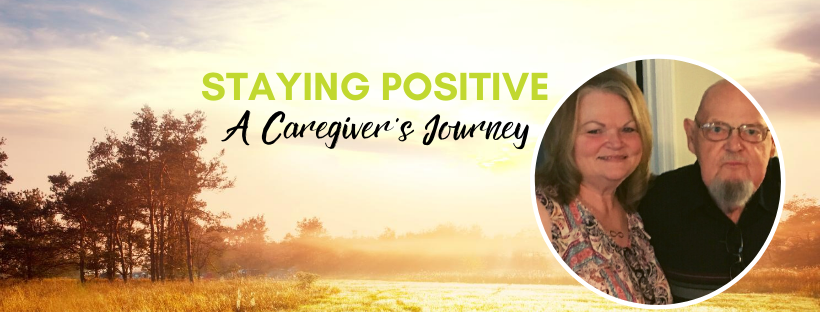
Oleta and Wayman Baker got married only two months after they met, but their almost 40-year marriage shows that love can overcome all odds. From meeting through church to traveling the country singing in gospel music together, Oleta and Wayman lived a full and happy life together. Although Wayman passed away from his battle against cancer in November of 2019, Oleta’s love and dedication to Wayman continues on.
Wayman was diagnosed with leiomyosarcoma in March 2017. He noticed a spot on the side of his head that looked like a little sore. Within a month, it went from being flat to protruding at least a half-inch off his head. A biopsy confirmed it was cancer, and Wayman received 31 treatments of radiation on his head. Wayman was in remission for about a year when the cancer recurred in his lungs. The Bakers’ insurance wouldn’t cover the autoimmune treatment his oncologist wanted to put him on, so they were forced to search for other options, and Wayman was ultimately referred to Mary Crowley Cancer Research. Within a week, the Bakers were in the clinic for testing to determine whether Wayman would be a good candidate for one of Mary Crowley’s trials.
Wayman was enrolled onto a targeted therapy clinical trial that investigated IBI308 in advanced/metastatic cancers with high TMB expression. IBI308 is an anti-PD-1 monoclonal antibody that binds to and neutralizes PD-1 receptor mediated immune suppressive signals on T-cells and activates human immune response to kill tumor cells. Wayman had a complete response to the trial but unfortunately passed away from complications.
Oleta said they fell in love with everyone at Mary Crowley while Wayman was on trial. “I cannot say enough praise about everybody there,” she says. “They were amazing at the clinic. They were so good to us. We were so fortunate to be part of that trial in hopes that, if nothing else, what they learned from Wayman might help someone else down the road.”
Because Wayman’s children lived too far to help regularly, Oleta found herself carrying the heavy load of caring for Wayman on her own. The role as a caretaker of a cancer patient presents its own challenges that Oleta learned to navigate. “I felt like I was going through it as much as he was, even though physically I wasn’t,” Oleta explained. “I tried to stay as strong as possible and have an uplifted spirit.”
Staying positive is Oleta’s advice for anyone going through the same experience. “Listen when they want to talk. Hold them when they cry. Just be positive. But don’t feel like you’re weak if you cry. You have to be strong, but you’re going through as much as they are. It’s okay if you cry.”
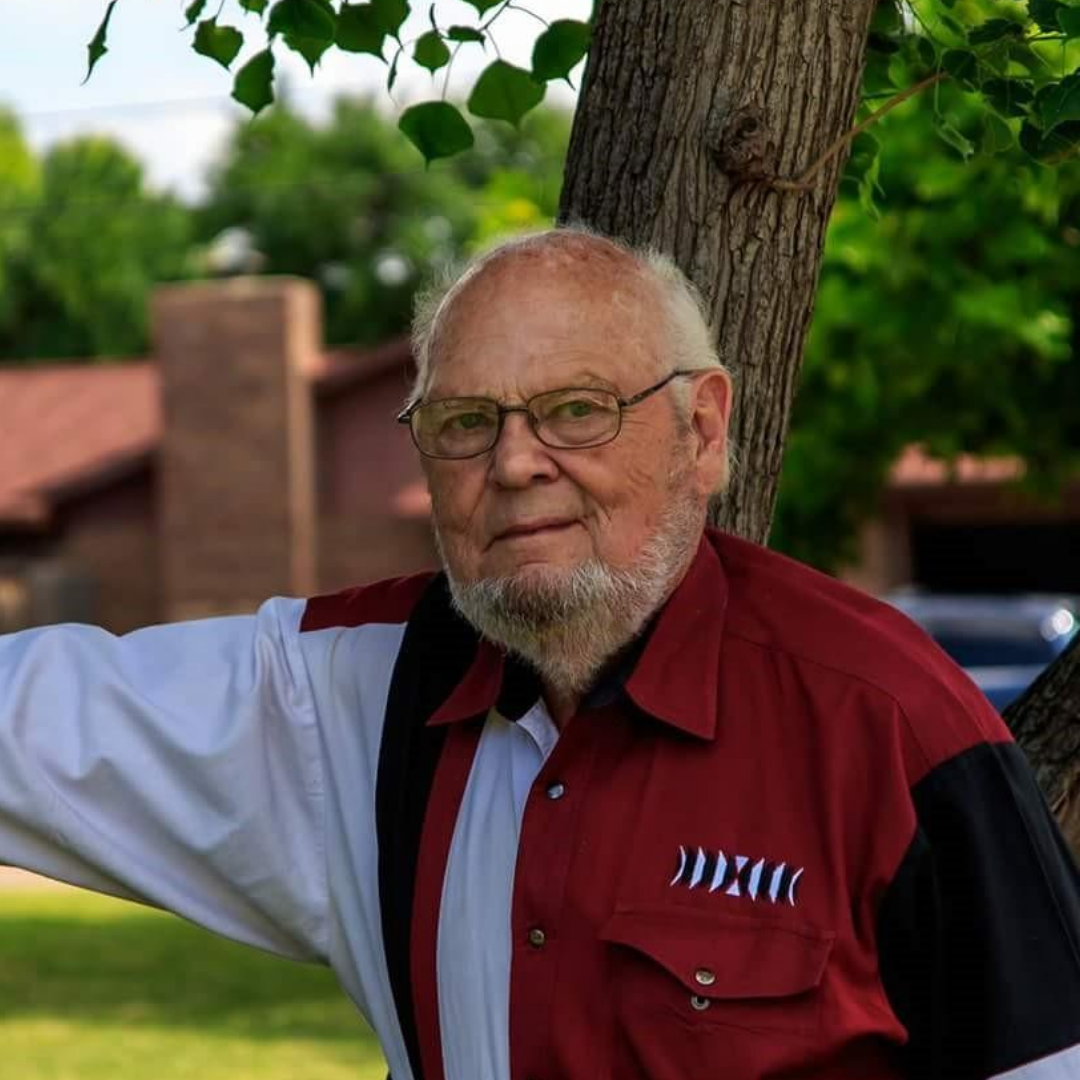 Today, Oleta’s support system consists of her brother, cousin, niece, and her best friend of 50 years. While she is grateful for their love and support, she finds solace in thinking back on special moments with Wayman near the end of their time together.
Today, Oleta’s support system consists of her brother, cousin, niece, and her best friend of 50 years. While she is grateful for their love and support, she finds solace in thinking back on special moments with Wayman near the end of their time together.
“The first time Wayman asked me on a date, he said, ‘Good morning, sunshine. How are you?’ From then on, we always sang You Are My Sunshine to each other. In hospice, I was singing it to him and talking like we were carrying on conversation, and out of the clear blue sky, he said, ‘I love you.’ He hadn’t spoken in four days. God gave me little special times that I can go back and remember that were especially just for me.”
New FDA Approvals
By Tina Nghiem
 Cancer patients with metastatic disease are typically treated with approved therapies by their primary oncologist/hematologist. Once the patient progresses on these therapies, the primary oncologist/hematologist may refer the patient to Mary Crowley Cancer Research to receive an investigational therapy. An investigational therapy is a treatment that is being studied as part of a clinical trial.
Cancer patients with metastatic disease are typically treated with approved therapies by their primary oncologist/hematologist. Once the patient progresses on these therapies, the primary oncologist/hematologist may refer the patient to Mary Crowley Cancer Research to receive an investigational therapy. An investigational therapy is a treatment that is being studied as part of a clinical trial.
There are four phases of clinical research. Each of the phases are conducted to generate safety and efficacy data for the Food and Drug Administration’s (FDA) determination of the drug’s approval. Mary Crowley specializes in performing phase I and II clinical trials. During phase I, the investigational drug is tested in a small group of patients to evaluate safety and determine a safe dosage range. Then during phase II, the investigational drug is administered to a larger group of patients to further evaluate safety and test for efficacy.
Recently, the FDA approved pemigatinib for the treatment of adults with previously treated, unresectable locally advanced or metastatic cholangiocarcinoma with a fibroblast growth factor receptor 2 (FGFR2) fusion or other rearrangement. The FDA’s decision was dependent on efficacy results from the phase II FIGHT-202 trial, or study #16-25. Mary Crowley not only participated in the phase II trial but also participated in the preceding phase I FIGHT-101 trial, or study #15-03. Over the past four years, Mary Crowley enrolled over 20 patients across both trials.
Furthermore, Mary Crowley has also participated in clinical trials that were instrumental in the approvals of a variety of other therapies in various cancer indications: panitumumab for colorectal cancer, bevacizumab for non-small cell lung cancer, talimogene laherparepvec for melanoma, sipuleucel-T for prostate cancer, ipilimumab for melanoma, irinotecan for colorectal cancer, ixazomib for multiple myeloma, durvalumab for urothelial carcinoma and non-small cell lung cancer, cabozantinib for hepatocellular and renal cell carcinoma, olaparib for ovarian cancer, cemiplimab for squamous cell carcinoma, and entrectinib for NTRK fusion-positive solid tumors.
To date, Mary Crowley has conducted over 650 clinical trials and has treated over 7,100 patients. Mary Crowley remains committed to bringing hope to cancer patients through innovative clinical trials while advancing treatment for patients in the future.
Understanding Mindfulness
By Jackeline Castillo, LCSW
 Education and learning opportunities are essential for any given profession to stay up to date on new tools and resources. I recently embarked on training to become certified in Mindfulness through the Dallas Yoga Center.
Education and learning opportunities are essential for any given profession to stay up to date on new tools and resources. I recently embarked on training to become certified in Mindfulness through the Dallas Yoga Center.
Mindfulness is a tool that has shown great outcomes in research and I wanted to understand more about it. Like most individuals, I understood the basics but wanted to get a better understanding of how mindfulness works. After recently completing the certification, I wanted to share some thoughts on what I understand mindfulness to be.
- Mindfulness is a form of meditation, but not all meditation is mindfulness.
- Focuses on the present moment.
- Invites us to focus on the here and now in a non-judgmental way.
- The experience will be different for everyone depending on how that person is feeling and doing that particular day.
- Reminds us that it takes practice to focus on the present and we don’t have to be perfect at being mindful.
- Reminds us to breathe, lets us become aware of how we are breathing (i.e. shallow, relaxed, deeply, or short breaths).
- It allows you to acknowledge discomfort you might be experiencing in your body.
- Tools needed - Just yourself. All levels of experience welcome.
- You don’t have to be mindful sitting or lying down, you can take mindful walks, focusing on your breathing, and notice the sights and sounds around you.
- You can do mindful movements - slow purposeful movements can be done seated.
- This is a form of exercise that works your brain.
Below are some resources if you decide you want to try mindfulness for yourself.
Apps
- Headspace
- Insight Timer
- Smiling Mind
- 10% Happier
Books
- Full Catastrophe Living: How to Cope With Stress, Pain and Illness Using Mindfulness Meditation. Author - Jon Kabot-Zinn
- Mindfulness-Based Cancer Recovery: A Step-by-Step MBSR Approach to Help You Cope with Treatment and Reclaim Your Life. Author - Linda Carlson, PhD
- Mindfulness: An Eight-Week Plan for Finding Peace in a Frantic World. Author - Mark Williams, Danny Penman
- Practicing Mindfulness: 75 Essential Meditations to Reduce Stress, Improve Mental Health, and Find Peace in the Everyday. Author - Matthew Sockolov
Valentine's Event
Mary Crowley supporters raised over $8,000 through a benefit hosted at Executive Medical Director Dr. Minal Barve’s home on February 15. The event was a night out for Valentine’s Day and featured a string quartet, cappuccino bar, and sweet treats for Valentine’s Day. Attendees, which included local oncologists, pharmaceutical representatives, and Mary Crowley staff, were able to bid on silent auction items while they mingled. Thanks to the generosity of our supporters, we were able to enroll more patients onto clinical trials!

Cancer Clinical Trials Panel
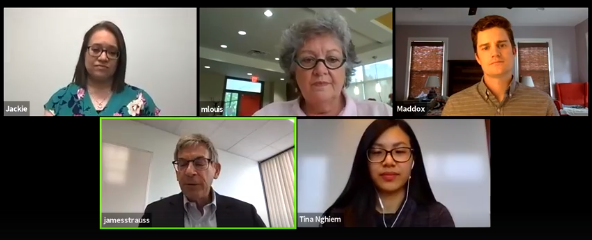 Cancer Support Community North Texas (CSCNTX) and Mary Crowley Cancer Researched teamed up on May 20 to host an online panel discussion to dispel myths about participating in clinical trials. The panel featured CSCNTX CEO Mirchelle Louis, as well as Mary Crowley Clinical Scientific Director Dr. James Strauss, Social Worker Jackie Castillo, and Associate Director of Clinical Trial Development Tina Nghiem. Our experts answered questions from D CEO Magazine Senior Editor Will Maddox and audience members through Facebook Live, about the importance of clinical trials, the process of opening a trial, and the psycho-social impact of participating in trials. Our panel of experts shed light on common misconceptions about clinical trials and provided more information to viewers on why clinical research can be a valuable part of a patient’s cancer journey. We look forward to more collaborations with CSCNTX to come!
Cancer Support Community North Texas (CSCNTX) and Mary Crowley Cancer Researched teamed up on May 20 to host an online panel discussion to dispel myths about participating in clinical trials. The panel featured CSCNTX CEO Mirchelle Louis, as well as Mary Crowley Clinical Scientific Director Dr. James Strauss, Social Worker Jackie Castillo, and Associate Director of Clinical Trial Development Tina Nghiem. Our experts answered questions from D CEO Magazine Senior Editor Will Maddox and audience members through Facebook Live, about the importance of clinical trials, the process of opening a trial, and the psycho-social impact of participating in trials. Our panel of experts shed light on common misconceptions about clinical trials and provided more information to viewers on why clinical research can be a valuable part of a patient’s cancer journey. We look forward to more collaborations with CSCNTX to come!
Wear White Day
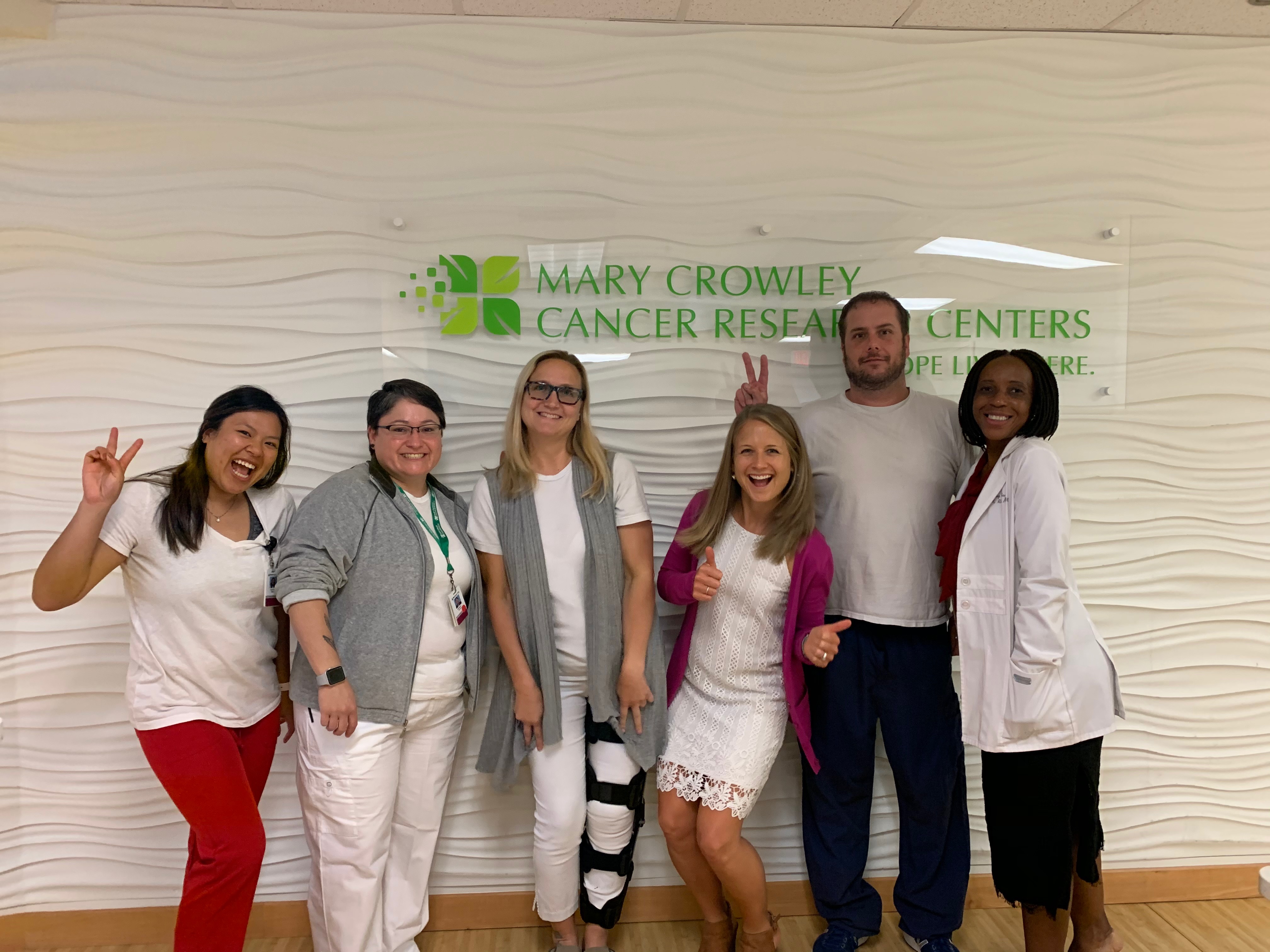 Mary Crowley staff participated in Wear White Day on June 12 to raise awareness of cancer immunotherapy research. June was immunotherapy awareness month, and our staff wore white to represent the immune system’s cancer-fighting white blood cells (lymphocytes) as well as to symbolize the lab coats worn by the scientists and white coats worn by clinicians working to find new immunotherapy treatments.
Mary Crowley staff participated in Wear White Day on June 12 to raise awareness of cancer immunotherapy research. June was immunotherapy awareness month, and our staff wore white to represent the immune system’s cancer-fighting white blood cells (lymphocytes) as well as to symbolize the lab coats worn by the scientists and white coats worn by clinicians working to find new immunotherapy treatments.
Red Nose Day
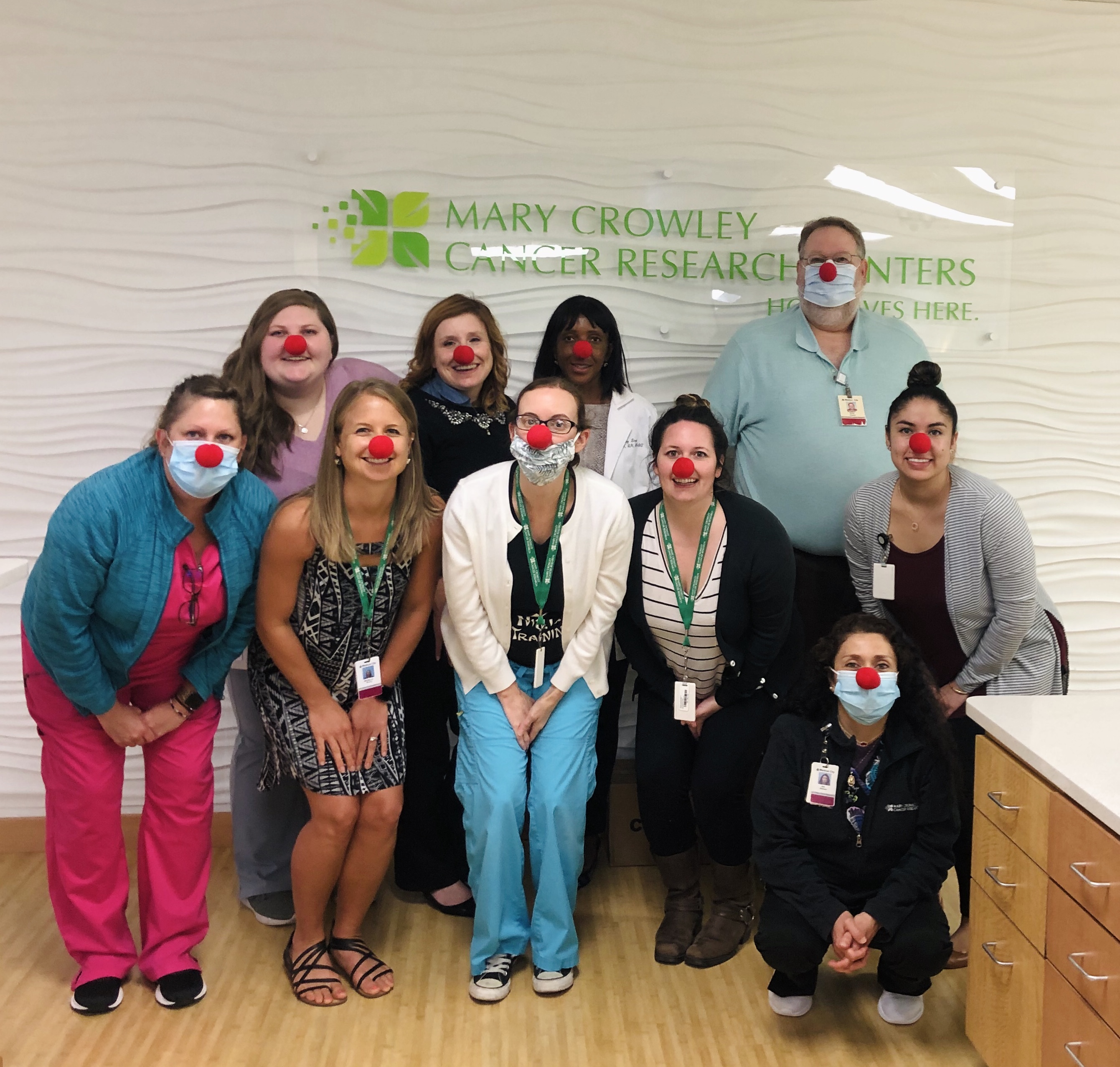 For the third year in a row, Mary Crowley staff honored the memory of former patient Donna “Donnabelle” Manna by wearing red noses on May 27th. The red noses are a reminder to all of us to live by Donnabelle’s life mission, which was to “spread joy.”
For the third year in a row, Mary Crowley staff honored the memory of former patient Donna “Donnabelle” Manna by wearing red noses on May 27th. The red noses are a reminder to all of us to live by Donnabelle’s life mission, which was to “spread joy.”
Fichtenbaum Trust Grant
The Fichtenbaum Charitable Trust, Bank of America, N.A., Co-Trustee, has awarded Mary Crowley with a $50,000 grant for combination therapy clinical trials. Combination trials are a major part of our clinical trial program, as they are an increasingly popular treatment method for cancer patients. Combination therapies pair two different types of treatments, such as chemotherapy and an immunotherapy, to combat against a patient’s cancer. The funds from this generous grant will allow Mary Crowley to open more clinical trials for combination therapies.
5 Questions with Jessica Bondurant
Clinical Research Coordinator
-
 Where did you grow up? I grew up in many different locations. I was a General Electric baby. I was born in Ponce, Puerto Rico, then moved to Del Rio Texas, upstate New York, Rhode Island, and then back to Texas to finish high school and then stayed for college at UNT in Denton.
Where did you grow up? I grew up in many different locations. I was a General Electric baby. I was born in Ponce, Puerto Rico, then moved to Del Rio Texas, upstate New York, Rhode Island, and then back to Texas to finish high school and then stayed for college at UNT in Denton. - How did you first hear about Mary Crowley and what made you interested in working here? Several of my friends at my previous job came to work here at Mary Crowley. A position became available here that they thought I was perfect for, so they let me know and I applied.
- What is your favorite part of your job? That’s really hard to pick. I love the interaction with the doctors and nurses to be a part of taking care of the patients. It is amazing to see how talented each one of them is and to be a part in helping them take care of the patients is pretty rewarding. Also, I get a strange satisfaction from organizing. I enjoy making sure all parts of a trial are working smoothly and being responsible for solving any issues or questions that come up.
- What inspired you to choose oncology research? Cancer has affected several members of my family, as I am sure it has affected everyones. I lost my grandfather to cancer when I was in school and all I thought was “he was so healthy and took such good care of himself, how did he still die of cancer?”. I decided around 19 that there had to be something out there that we could find and I wanted to be a part of it, no matter what that solution was. I then got side-tracked with college and life and didn’t really know how to get into it. Magically 16 years later, I was offered the chance of a lifetime.
- What do you enjoy doing in your free time? I spend my time outside of work with my family, watching cooking shows with my husband, playing with my 5-year-old or being entertained listening to her play with her 4-year-old sister, and talking to my pre-teen. We are doing our best to stay at home, so we play in the backyard and sit on the patio before it starts getting too hot. Also working on getting ready for the next little one to join the family very soon.



